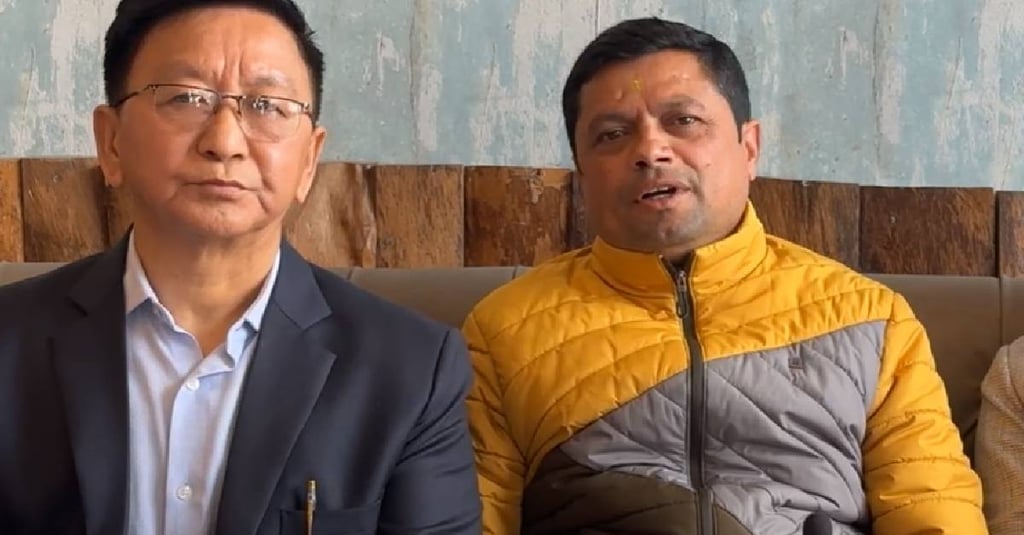Sikkim: Former CAP President LP Kafle explains resignation, alleges leadership failures
Sherpa said that he had hoped CAP would take Sikkim to new heights, but instead, the party was moving in a different direction.
LOCAL


Former Citizen Action Party (CAP) President LP Kafle has come forward to explain his decision to resign from the party, citing a deviation from its founding principles. Along with Kafle, several other key members, including CAP’s Gangtok candidate Dawcho Lepcha, CAP’s working president (administration) Lakpa Sherpa, Upper Tadong candidate Ravi Gurung, and West Pandam candidate Dr. S. Madan Rasaily, have also stepped down.
During a press conference, Kafle expressed his disappointment with the party’s leadership, accusing it of failing to uphold its constitution and vision. “I was one of the key members involved in forming the Citizen Action Party and drafting its constitution. It was created after consulting many intellectuals, with a clear vision and ideology. However, what we see today is completely different from what we had envisioned. The party is neither following its constitution nor its founding principles,” Kafle said.
He pointed out that CAP initially had 11 working presidents as per its constitution, but this structure was dismantled after the party lost the election. “Before the elections, we had a collective leadership, but after losing, all working presidents were removed, leaving only the vice president. Now, the party appears to be run by a single person rather than a collective leadership,” he said.
Kafle further highlighted that the party contested the elections under the leadership of Bharat Basnett. When Basnett took moral responsibility for the defeat and resigned, the party continued functioning under him. However, Kafle alleged that CAP failed to follow its constitution in handling Basnett’s resignation. “As per the party’s constitution, the Central Executive Committee (CEC) or the Leaders’ Council should have been called to discuss the resignation. Instead, a CEC meeting was held where tentative candidates for the presidency were declared, which was against the party’s constitution,” he said.
Another major reason for his resignation, Kafle said, was the current CAP president’s controversial statements on Article 371F and Sikkim’s merger with India. “The present president has said that Sikkim’s merger happened unconditionally and that the Indian government can decide on its special status as it wishes. No Chief Minister, from the first to the current one, has ever made such a statement. A true Sikkimese leader should not say such things, as they create a negative image of Sikkim and encourage unnecessary discussions on the merger issue,” he said.
Moreover, Kafle criticized CAP’s approach to opposition politics. “An opposition party should not always oppose the government. It must also support good initiatives, like the effort to secure tribal status for the 12 left-out communities. This is a positive step by the government, and even the opposition should back such causes. However, the present CAP president is against every major decision of the government, even when it benefits the people,” he added.
CAP’s working president (administration), Lakpa Sherpa said that CAP emerged from the Sikkim Reform Call organization in 2019, which later launched the ‘Sikkim Sudhar Yatra.’ After extensive discussions with intellectuals, CAP was formally established on January 26, 2023, with a vision to bring administrative, economic, and political reforms.
Sherpa outlined the three core principles of CAP:
Collective leadership: The party was meant to function under shared leadership rather than being controlled by one person.
Flagless politics: CAP had initially decided not to use party flags, symbolizing a break from traditional party politics.
Sloganless politics : The party aimed to focus on governance rather than catchy political slogans.
However, Sherpa said that the party is now drifting away from these principles. “We had envisioned a self-reliant and peaceful Sikkim, but today, CAP is forgetting its core ideas. Slogans have started to appear, and soon, flagless politics will also be abandoned. Even the rule that the party president would not contest elections is being ignored. This is not the CAP we created,” he said.
Sherpa said that he had hoped CAP would take Sikkim to new heights, but instead, the party was moving in a different direction. “We had dreamed of making Sikkim self-reliant and prosperous, but now the party is no longer focused on that goal. This is why I resigned,” he said.
